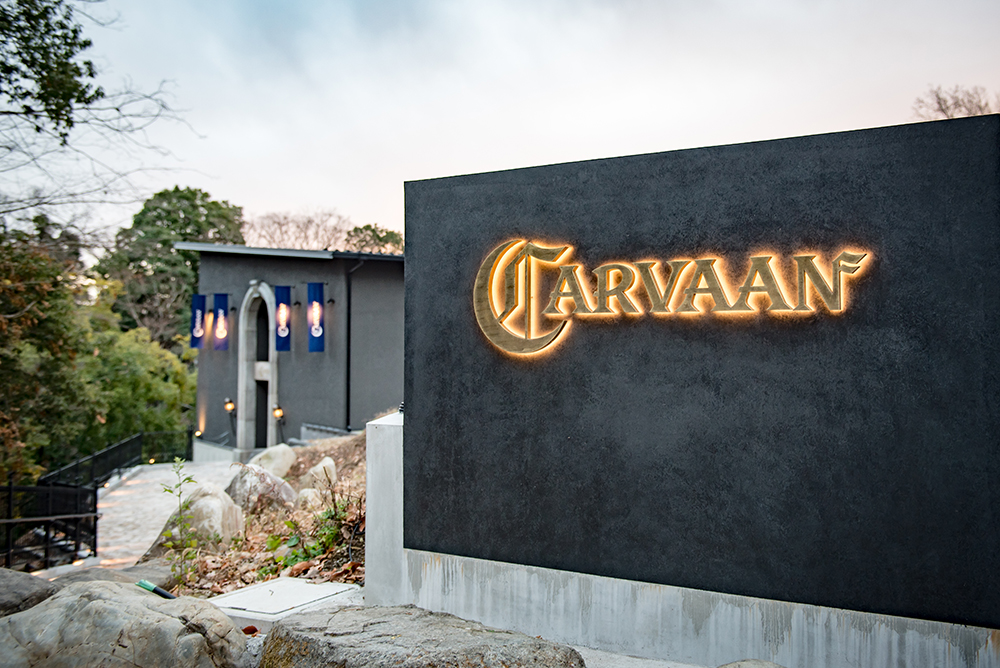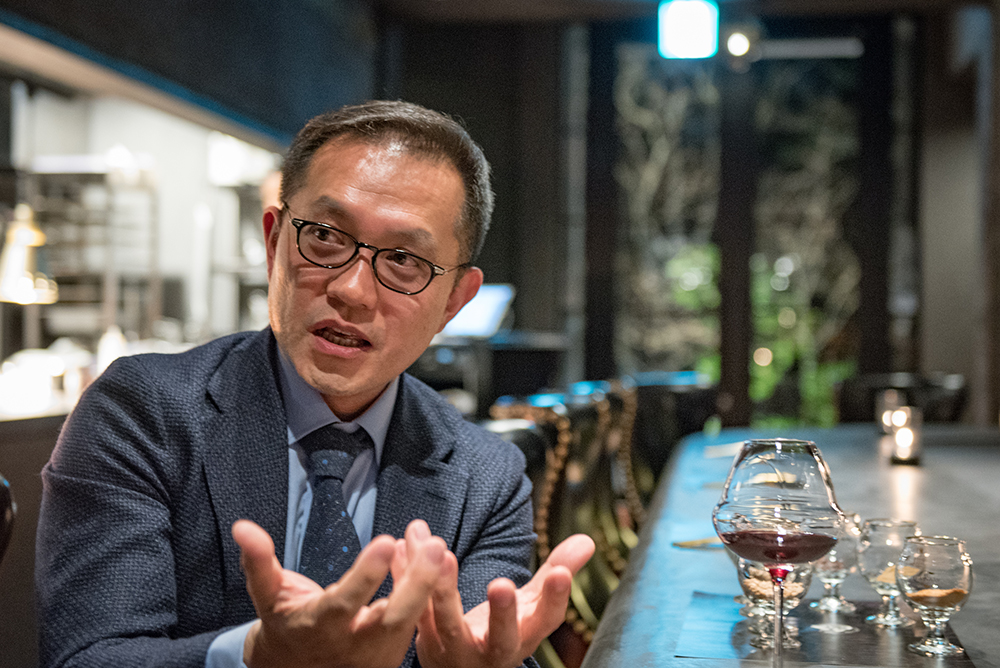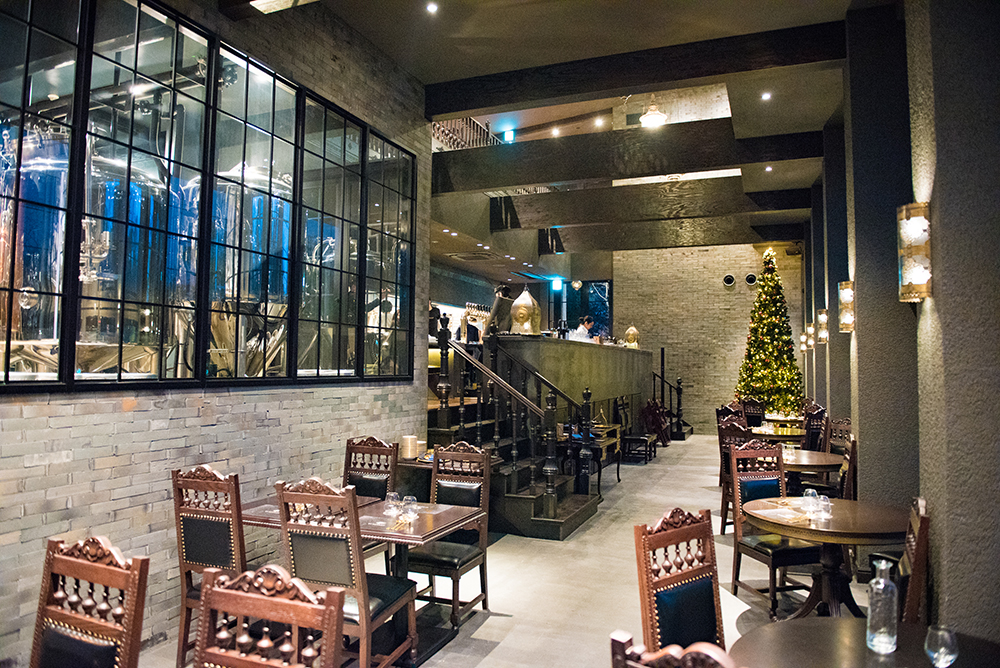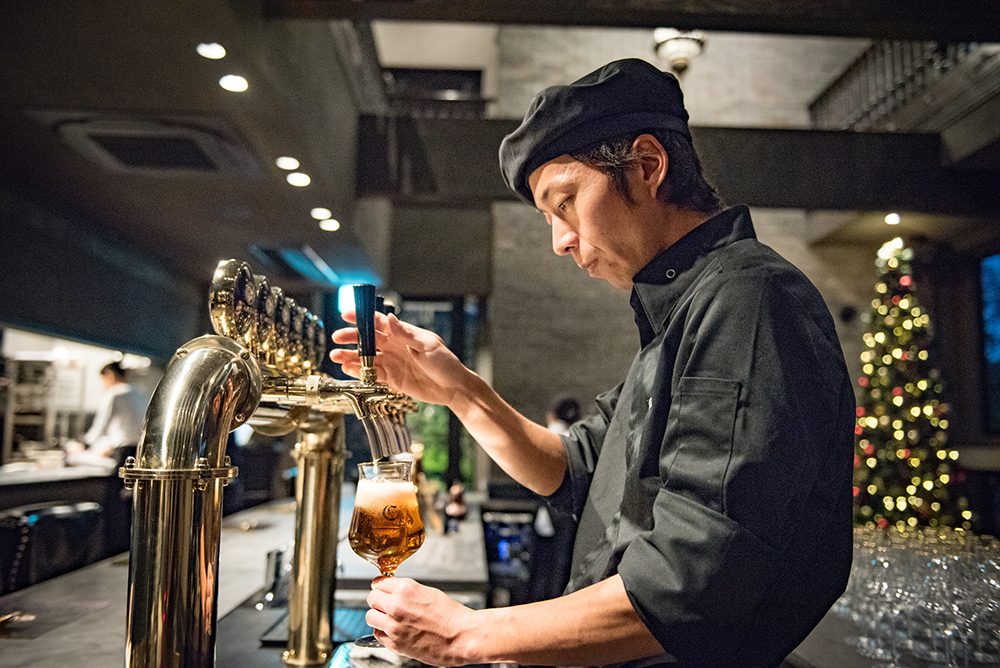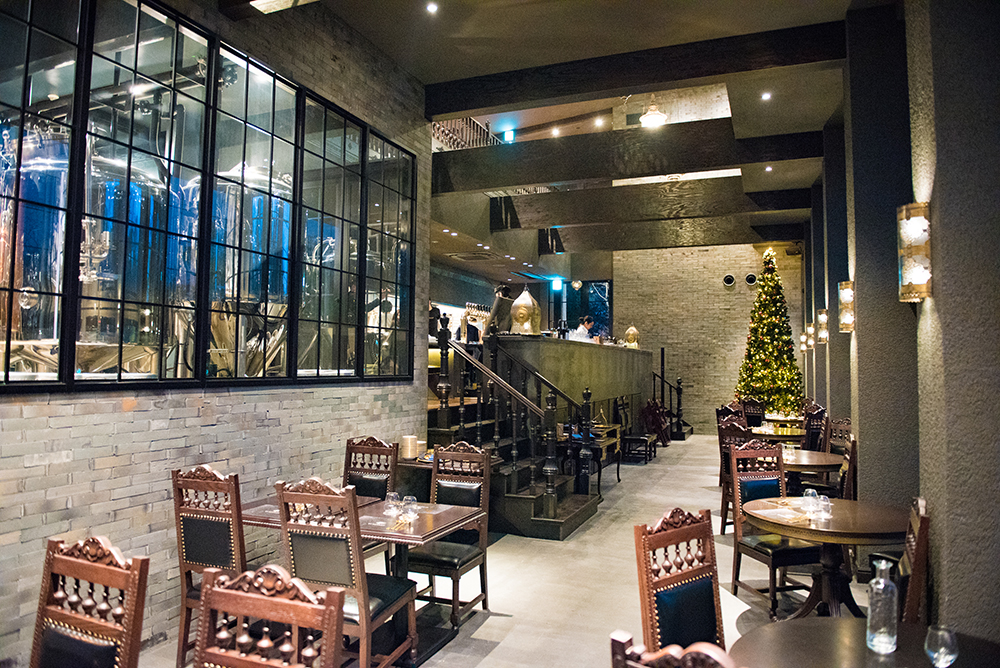Caravans acquire and trade unique items in their travels, dispersing the culture of one land in all the regions they touch. The image of caravans moving to and from the Far East and Africa provided the basic concept for Brewery & Restaurant Carvaan [sic], which opened in July of 2017 in Hanno City, Saitama. The enterprise is a bazaar of cuisine and culture with a wide variety of tastes, aromas and stories gathered from the Middle East, Africa, South America, and other distant parts of the globe. This caravan is lead by Toshiyuki Sasaki, President of parent company FAR EAST Inc. Riding in tow are brewers Kenji Ito and Sakae Kimura.
Before I talk about the allure of Carvaan, allow me to provide more background on FAR EAST. Founded in 1994 in Kawagoe, Saitama, the company originally manufactured car navigation systems. The main focus has shifted greatly to international trade. In 2002 the salt trade was deregulated and President Sasaki set his mind on adding this to the company’s business. FAR EAST began importing and selling a variety of salts that were not previously available in Japan. Sasaki considered similar essentials that humans commonly sought in food–like sugar and fats. Historically, societies with an abundance of these often thrived. Fats can be found in nuts and olives; sugar in dates and figs. These items, as recorded in the ancient stories of the Bible and Koran, are all present at an oasis.
In Sasaki’s travels to find salts to import, he encountered a variety of fruits, nuts, spices and herbs that piqued his interest. The company began importing these items as well. Sasaki eloquently relates the tales of his travels with a sense of dignity, but at the same time fills the stories with a good dose of humor. With animated gestures, he starts to talk about visiting papyrus groves beyond Cairo and seeing riches of coffee beans, papaya, bananas and pineapples. He then shifts the conversation to a desert at the foot of the Tian Shan mountain range of Central Asia. He passionately talks about finding sparkling green grapes growing in the area despite stifling hot gusts of wind reaching 70℃. From there he animatedly takes us on a journey to lush, green oases on the Libyan border where the native dates are said to be exquisite. He tells a tale of Alexander the Great looking upon the area saying, “If I am to die, I wish for my final days to be here.” Sasaki weaves his tales like a grand storyteller narrating One Thousand and One Nights (Arabian Nights). As a listener, you are drawn deep into his evocative stories of adventure, imagining yourself traveling alongside him.
It is through Sasaki’s passions that his company has come to place great emphasis on the cultural story of each product. In fact, he emphasizes that one of the five corporate tenets of FAR EAST is to ensure that their products are presented together with those stories. From a quality standpoint Japan has no shortage of high-quality products available to consumers. To differentiate itself in the marketplace, a company must go beyond just having a quality product. If the product presents a compelling story, there is an added attraction for consumers. Those that make a purchase then in turn pass the story on to other potential buyers. Sasaki asserts that “selling the story” is a requisite part of the business.
The second tenet is “Natural, Organic, Safe, Fair”. Though the company is not outspoken about it, meeting these four requirements is a given. “Sustainable” is the third tenet. Instead of acquiring resources as they need them, they operate in the spirit of the motto “small-scale, prolonged, developmental”. The final two key tenets are “Valuable” and “Satisfactory”. They offer many products from so-called “developing nations”, but never take advantage of their buying power to sell the products at cut-rate prices. Sasaki explains, “These items are not from Japan. That alone carries sufficient value. We sell our products according to their value and return the appropriate portion of the profit to the supplier.” In doing so, all involved can derive satisfaction in the product, from its business partners to its customers to FAR EAST itself.
In addition to its core importing business, it has expanded its organization with other ventures that embody its corporate philosophy. The catalyst for this was the “Jali Organic Project”. The village of Jali can be found on tiny Bussi Island in Uganda’s section of Lake Victoria. It’s an impoverished village of around 300 people. Surprisingly, the number of people per household sometimes approaches fifteen. The AIDS epidemic, malaria and diseases from unsanitary water claim many lives. As a result, orphaned children are taken in by neighbors. Though there are problems, the village is a lush green area where crops such as pineapple, mango, banana, and coffee grow in abundance.
The driving force behind the Jali Organic Project is Moses Kibuuka Muwanga. He has made it his mission to save this small obscure village from its cycle of suffering and poverty. Born in Uganda in 1965, Muwanga fled the country with his mother when he was young. Later in life, he relocated with his wife and children to the UK, where he became a videographer. In 1995 he inherited 640 acres in his father’s will and visited his homeland for the first time since childhood. He was shocked by the rampant poverty, though the area was abundant with resources. Pineapple alone accounted for 3000 tons of the crop yield during the harvest season. But ripe pineapple only lasts about a week before it starts to go bad. Since 300 people couldn’t possibly consume 3000 tons of pineapple during the harvest period, most of it rotted and went to waste.
Muwanga was convinced that by altering the approach to agriculture, the wealth of the area’s natural resources could be used to alleviate the chronic poverty. If the fruit were processed into dried fruit, he felt that it could be sold in international markets. Muwanga approached his older brother Ephraim, who lived in Germany at the time, to assist in the launch of the project. However, the local residents were wary of “wealthy foreign exiles” and trust would have to be earned a little at a time. Gradually over a period of three years, Muwanga began to gain the trust and understanding of the villagers. The project gained ground as he studied the processing of dried fruit with the assistance of books and internet videos. A well to procure clean water was dug. Muwanga built a factory, brought in desiccation equipment and trained workers daily. Sales of the dried pineapple began to pick up and demand in overseas markets rose. However, the videographer had no skill or experience in international trade. As fortune would have it, he crossed paths with Sasaki.
Sasaki had served as a member of JETRO’s (Japan External Trade Organization) review board for agricultural products and heard about Jali’s pineapples. By chance he had met Ephraim in Nuremberg, Germany. Fifteen years after the project had begun, Sasaki journeyed to Jali. He arranged for samples of the dried fruit to be sent to Japan. Because of problems like packaging and sanitation, he didn’t think the product would sell in the Japanese or international markets without major changes. But FAR EAST didn’t give up on the project.
“When you are conducting business with people of differing religions, cultures and languages, some turmoil is bound to occur. Things that aren’t a problem in one culture may present major problems in another. Often, when faced with complicated issues due to these differences, most companies give up. But it’s our company’s philosophy to bridge that cultural divide,” says Sasaki, shrugging off the complications as normal challenges of the business. He sent his staff to Jali and had them start by teaching the locals basic math. After that, FAR EAST assumed responsibility for all training, from quality control, sanitary procedures, food preservation and packaging on the manufacturing end to international trade practices and business procedures.
In 2012, Muwanga took a group of the Jali project members to Japan to participate in the Tokyo International Gift Show, one of the largest trade shows in Japan. Reception of the products greatly exceeded expectations and soon orders were rolling in. ”At the trade show I was able to see firsthand just how popular the dried pineapple was with Japanese consumers and how much money they were willing to pay,” claims Sasaki. Muwanga’s team went home with precious knowledge of Japanese business practices and an understanding of the value of their product in the international market. Launched by Muwanga, guided by the continuous support of FAR EAST, and driven by the villagers of Jali, the project gained momentum a step at a time. Word of its success even reached the ears of Uganda’s president. He was delighted to see exports heading to Japan and put his weight behind funding for the construction of roads, schools and a hospital.
Organizations worldwide took note of FAR EAST’s work in Jali and approached them with interest. Using the Jali Organic Project as a model, similar initiatives were started in Cameroon, Tanzania and Pakistan. These are not managed by Sasaki, but by members of the Jali Organic Project team. Sasaki explains the reasoning. “If we don’t hand off supervision, it just becomes a business run by Japanese. To be successful it needs to become an independent enterprise. Business is not intrinsically win or lose. I think business should be about ensuring the satisfaction of all involved.” This business model, which combines CSR with that goal of mutual satisfaction, is a rarity in Japan.
Citing the Jali project as inspiration, Sasaki tells us that Carvaan was determined to pursue CSR activities from its inception. FAR EAST constructed the brewery and restaurant in the picturesque valley of Hanno City cut by the winding Iruma River. The area along the river banks, known as Hanno-gawara, is a great place to see cherry blossoms in full bloom in spring and colorful foliage in autumn. During the summer months people flock here for camping or barbecues among the lush greenery. In the past, however, the area had fallen into neglect and was full of abandoned buildings. There were proposals to revitalize the area with parks, schools, apartments and a library, but residents couldn’t agree on how the land should be developed. Sasaki, who had relocated his business to Hanno from Kawagoe in 1997, was eventually asked to create a place where people could gather and talk about their hopes and dreams. He built Carvaan to satisfy that need. FAR EAST was destined to not only have a positive impact in places like Africa and South America, but also right here at home in Japan.
So why start a brewery? The roots of beer can be traced back to ancient Mesopotamia where the Sumerian civilization stumbled onto the concept while making bread. The international culture of beer and its fascinating history was a perfect vehicle for the company’s five precepts. In that context, the possibilities that brewing presented were far-reaching.
FAR EAST’s brewery, Carvaan, operates under two main principles. The first is to celebrate brewing’s long history and diverse culture which stretches across political boundaries and multiple eras. Reviving some ancient recipes and incorporating modern know-how to brew flavorful beers is key to that goal. FAR EAST can make use of its strengths as a trading company to provide its brewery with an array of malt, hops and other raw materials from a variety of countries around the world.
The second principle is to embody agricultural practices based on traditional Japanese methods in its capacity as an international trading company operating around the world. FAR EAST leases farmhouses (kominka in Japanese) constructed about 130 years ago in Hanno City’s Minamikoma district, long a base of agricultural know-how. There the company is growing eleven varieties of hop imported from Portland, Oregon and mulberry plants that are used in the making of washi (traditional handmade Japanese paper). No pesticide or fertilizer is used at the farm. In the future they are also planning on malting barley.
As noted above, beer made by Carvaan adheres to the core tenets of the parent company. The team strives to make great beer that expresses world culture and history while deriving personal satisfaction and remaining open to new ideas in the process. Carvaan calls the concept “Arabian craft beer”. Brewers Ito and Kimura guide its implementation.
Ito boasts an interesting resume. Prior to joining Carvaan he wasn’t involved in beer. He worked as an art director in advertising for 30 years but felt that it was time to close that chapter in his life. He was always fond of beer, however, and had a penchant for making things by hand. He naturally became interested in putting those two hobbies together. He joined FAR EAST in June of 2016 while studying the brewing process on his own. Immediately after being hired, he was sent to Outsider Brewing (see JBT#25) in Yamanashi, where he trained for roughly two months. He’s more than a brewer, though; he puts his previous career skills to work by designing and printing the company’s labels, too.
Brewer Kimura, on the other hand, is a fourteen-year brewing veteran. He developed the “TOKYO BLUES” line while working at Ishikawa Brewery in Fussa, Tokyo. His wife, also a brewer, works at Coedo in Saitama. She heard about a job opening at the new Carvaan Brewery and Kimura applied. He joined in April of 2017. Ito says of Kimura, “He excels at subtle brews. He has accumulated significant experience to draw from over his long career.” The brewing methodology of the two is quite interesting. The creator of a recipe is responsible for brewing it without any assistance or input from the other. Each beer reflects the personality of its respective creator. Sasaki laughs when describing this situation, “It’s not because they can’t get along!”
Carvaan has four standard beers currently. The Arabian Lime Ale uses Egyptian lime peels in the brew. It has a strong malty flavor and a refreshing aftertaste. Before Carvaan’s official opening, an event serving the beer was held in September of 2016 at Hanno-gawara. It was a success in that many of the locals knew little about craft beer, but found it to be delicious. They kept coming back for more and were happy to find out that local beer was being made in Hanno. Sasaki smiles when reflecting on that day. “It was an unforgettable moment and I was filled with joy.”
Spelt Weizen is made with an ancient wheat variety called spelt. Compared to common wheat, it has less gluten, a stronger aroma and a bolder flavor. Spelt has a tough outer husk, which causes some difficulty for brewers, but this also makes it more resistant to insects and thus easy to grow without use of pesticides. FAR EAST also uses the grain in baked goods they produce. The recipe was developed by Kimura. “I had wanted to make a wiezen that exhibited the estery aromatics unique to the style. In this beer that aroma is accentuated. It is robust and full-bodied, but very drinkable. My goal was a session beer,” he says.
Next is Kimura’s Far East Belgian White, which uses Egyptian coriander. Coriander grown in the fertile Nile River Valley had a significantly stronger flavor and aroma than the usual varieties available at the market. Because it packs an added punch, the brewer needs to exercise caution when using it. Instead of using of orange peel, which is the norm, this beer is made with a mixture of Japanese citrus fruits. The previous iteration was made with organic lemon peel from Hiroshima Prefecture. The beer is made using a combination of complete peels and only zest. The whole peel provides a bittersweet flavor while the zest delivers a crisp aroma. Only a precious 200g of zest is yielded from 60kg of lemon. FAR EAST makes gelato and baked confectioneries, so what isn’t used for the beer goes into other products. In an upcoming version of the Belgian White, there are plans to use yuzu grown in Hanno instead of the lemon, but because of differences in aroma and taste, some tinkering with the recipe will be needed.
Rounding out the four standards is Andes Cacao Stout. It was developed by Ito, who has a fondness for dark beers. The cacao plant is native to South America and the cacao nibs for this stout are imported from Columbia. The sweet aroma derived from the cacao blends nicely with that of the roasted malt. The taste is complex and elegant.
In addition to the regular lineup, Carvaan had produced four seasonals at the time of our interview. The summer seasonal Passion Lager used passion fruit from Ecuador. Hanno Fresh Hop IPA, just as the name indicates, used locally grown hops. Only a small batch was made due to the limited harvest. Carvaan Christmas Ale is a Belgian Strong Ale made with a combination of three malt varieties and two different yeasts. The fourth seasonal is the herbal Apple Ginger Ale, to which they added an apple jam containing ginger and cinnamon prior to fermentation. A traditional English IPA is in the works for the future. The restaurant attached to the brewery usually serves one or two of the seasonals alongside the standards.
Carvaan has a 500L brewhouse with four fermenters and three storage vessels (all 500L). Sasaki personally went to China to purchase the system in April of 2016. The equipment is operated manually. Kimura says he likes the hand-operated equipment since it gives him a true feel for his work. Looking ahead, bottles and kegs are expected to be available for purchase from June of this year and there is also talk of opening a store in downtown Tokyo.
The nearest station to Carvaan’s facilities is Hanno Station on the Seibu Ikebukuro Line, which can also be accessed by the Fukutoshin Line via Shibuya (about one hour). The 15 to 20-minute walk from the station is a chance to stroll through the Hanno-gawara area. The restaurant offers dishes that epitomize world food culture, mixing locally grown products with ingredients imported from all over the world. Foods like hummus, falafel, and marinated olives give it a Middle Eastern touch. Of course, it all goes well with the types of beer they produce. Imported wines are also available and they intend to produce wine from grapes grown on their own farm.
At Carvaan each drink, meal and dessert has its own personal story. Hearing the stories from the staff while drinking “Arabian craft beer” allows customers to experience cultures from abroad delivered to their table in Hanno. After you have read this article, it’s your turn to become the next storyteller.
by Chiaki Akasofu
This article was published in Japan Beer Times # () and is among the limited content available online. Order your copy through our online shop or download the digital version from the iTunes store to access the full contents of this issue.

